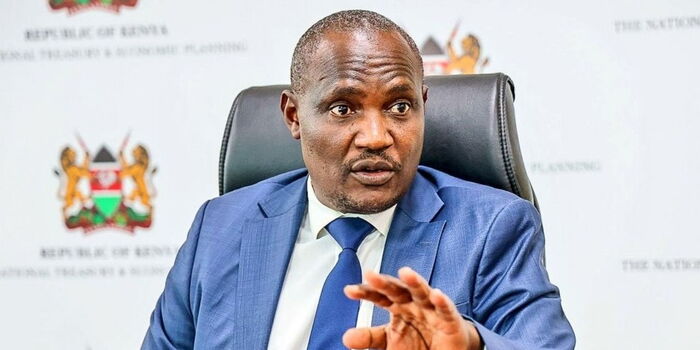Treasury Cabinet Secretary John Mbadi on Wednesday estimated the budget for the financial year 2025/26 at Ksh4,485.7 billion (4.5 trillion).
The Treasury Ministry published the 2025 Budget Policy Statement (BPS) cutting across the financial years of 2025/26, 2026/2027, and 2027/2028 and invited Kenyans to give comments on the BPS before its enactment.
“The total budget for FY 2025/26 is projected at Ksh4,485.7 billion. The allocations to the three Arms of Government including sharable revenues to the County Governments,” read the Draft 2025 Policy in part.
This budget estimate represents an increase from Ksh3.0 trillion in the 2024/25 financial year.
A key thing to note in the 2025/26 budget is that the government will entrench the zero-based budgeting approach in preparing budgets.
Treasury Cabinet Secretary John Mbadi during the review of Performance Contracting and Validation Meeting at the Treasury Building on October 9,2024.
Ministry of Treasury
Zero-based budgeting (ZBB) is a budgeting method where every expense must be justified from scratch for each new period, rather than basing it on previous budgets.
This means that instead of starting with last year’s budget and making adjustments, the government will start from zero and evaluate each expense to determine its necessity and cost.
According to the budget estimate, the National Government was allocated Ksh2.7 trillion up from Ksh2.3 trillion in the previous Financial Year.
In the National Government, the executive got the biggest share at Ksh2.7 trillion followed by Parliament at Ksh42 billion and Judiciary at Ksh25.6 billion.
County governments, on the other hand, were allocated Ksh405 billion, a drop from Ksh410 billion governors received in the 2024/2025 financial year.
The Ministry further revealed that the budget prioritises the Bottom-up Economic Transformation Agenda (BETA), focusing on sectors like agriculture, MSMEs, housing, healthcare, and the digital economy.
To get to this amount, the government aims to boost revenue collection through various measures including implementing the National Tax Policy and Medium-Term Revenue Strategy 2024/25-2026/27.
The Kenya Kwanza government will also be strengthening tax administration through expansion of the tax base, minimising tax expenditures, leveraging technology, sealing revenue loopholes, and enhancing the efficiency of the tax system.
According to Mbadi, in the 2025/26 Financial Year, the government plans to reduce tax expenditures which currently stand at 2.94 per cent of GDP.
In the year 2025/26 the government’s key focus will be on reducing public debt vulnerabilities. The government also intends to shift to accrual accounting to improve the management of public resources.
In an official notice dated Wednesday, January 15, CS Mbadi has invited Kenyans to give comments on the budget. Mbadi noted that Kenyans have until January 21, 2025 to give their comments. Encouraging Kenyans to participate, Mbadi revealed that the comments of all Kenyans on the Budget mattered.
“Section 25 of the Public Finance Management (PFM) Act, 2012 requires the National Treasury to seek and take into account the views of stakeholders and the public in preparing the Budget Policy Statement (BPS) before submission to Cabinet for approval, and thereafter submission to Parliament,” part of the statement by Mbadi read.
A photo of the entrance of the National Treasury offices in Nairobi taken on March 16, 2018.
Photo
National Treasury


